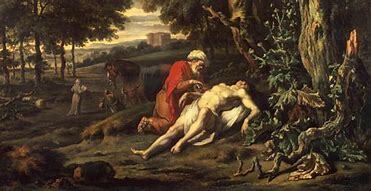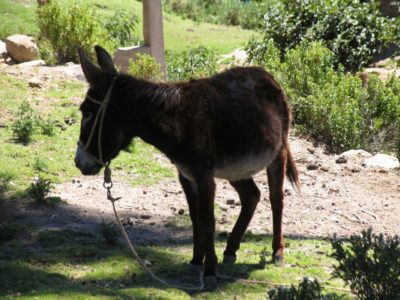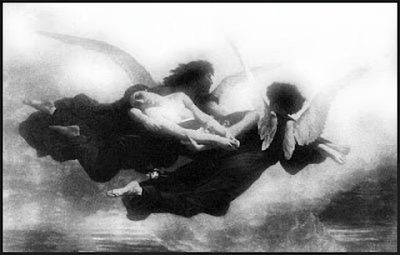July 10, 2022
|by N W
|
0 Comments
|
Compassion, Deacon Barry
|
Good Samaritan, Redemption
Fifteenth Sunday in Ordinary Time
July 10, 2022 — Year C
Readings: Dt 30:10-14 / Ps 69 / Col:15-20 / Lk 10:25-37
by Rev. Mr. Barry Welch, Guest Homilist
Today I would like to share my take on Bishop Robert Barron’s take of one interpretation of The Good Samaritan parable.
A man fell victim to robbers as he went down from Jerusalem to Jericho. What is Jerusalem, and what does it represent? Jerusalem is the holy city. It’s where the temple is, and where God resides. It represents our eternal home: the New Jerusalem. It also represents communion with God. Paradise. Heaven.
A man was going down from Paradise to Jericho. What is Jericho? Jericho historically is an immoral, pagan city. It’s decadent and selfish, separation from God.
What happens on this trip from Jerusalem to Jericho? There is a fall. The man falls, because Satan, in the form of robbers, robs this man of his innocence, strips man naked. Instigated by Satan, sin is introduced, and man is near death, wounded, beaten, lifeless.
Does any of this sound vaguely familiar? Paradise, bad choice, fall from communion with God, instigated by Satan. It sounds a lot like the Fall of Adam and Eve in the Garden of Eden, doesn’t it? Adam and Eve’s choice of sin cast all mankind on this path.
What comes after the Fall? What happens next? The man is lying there, paralyzed by sin. A priest comes along. He represents the law. The priests give sacrifices and holocausts. But abiding by laws is impossible for us. We can never be perfect for those laws. We will always come up short.
Next a Levite comes by. He represents the prophets, who call out man’s moral decay, greed, worshipping of false gods, falling further from the law in both the spirit of the law and the word of the law. But man doesn’t listen to prophets. His heart is hardened. Prophets, you remember are often ignored and sometimes killed.
So we have man fallen. The law and the prophets pass by and then, along comes the Good Samaritan. I propose that the Good Samaritan represents Jesus, the true hero of this story. Like Samaritans of that time, Jesus was hated and despised and rejected. Jews hated Samaritans. And yet, He is moved by compassion for fallen man. He approached the victim. That’s precisely what God does in the incarnation. He enters His creation. He approached man by becoming man, becoming one of us in order to heal what was broken.
The Samaritan poured oil and wine over the wounds and bandaged them. He gave man the Sacraments: Oil of Catechumens to cleanse and heal from sin in preparation for Baptism, Chrism Oil that strengthens us in the Holy Spirit, and the Oil of Anointing to heal our bodies and souls. Also wine, the blood of the new and everlasting covenant at every Mass.
What happens next? The Good Samaritan lifts up the fallen man and brings him into an inn and cares for him there. What is the inn? It’s the Church. That’s where we all come to be made whole, to heal our wounds. That’s why we’re here, to heal.
Man is lifted up, brought to the inn, cared for, and then Jesus pays the bill. Jesus pays the bill for man, stripped bare, fallen and injured from sin. Jesus takes our place, and He is stripped bare, falls three times, is injured and beaten and left for dead. There’s nothing man can do. There’s nothing man can pay to save himself. It’s Jesus who pays what we owe—on the cross. That’s why we have a crucifix prominently displayed on the altar, one turned toward the priest to remind him and us that He became the victim. The victim offered on this altar is the same that was offered on the cross, to free us from the captivity and injury of sin. He took man’s place and until He returns, He leaves his bride, the Church, over which the gates of hell will never prevail. Here generations continue to be healed and continue to give Him praise, worship, thanksgiving, and love for removing our debt, a debt impossible for us to pay.
We love you, Lord Jesus. We thank you, Lord Jesus. Heal us, Lord Jesus.
Sometimes when you’re trying something new, barriers arise, especially if you want to do something good and follow Jesus. Stumbling blocks occur and sometimes we make mistakes on our way. We get discouraged in this new path that we’ve taken. Frequently we revert back to whatever we were doing before. Whatever we used to do is easier and more comfortable.
That’s exactly what the disciples in today’s gospel were doing. Peter said, “I’m going fishing.” That’s what Peter had done his whole life before he started this three-year ministry with Jesus. All of the things that happened in Jerusalem—Jesus’ arrest and crucifixion—were just too much for Peter and the other disciples to take. They decided to go all the way back home and go fishing. Did they catch any fish? No. They fished all night long in the dark and did not even catch one fish, until someone came along to help them. Who was that? Jesus.
They left this life with Jesus to go back to fishing, but Jesus didn’t leave them alone to figure things out for themselves. He pursued them. He followed them to where they were. Remember, after Jesus was crucified, everyone ran away, because they were frightened. Peter, the leader of them all, denied Jesus three times. Afterwards, when they are afraid and locked in a room, Jesus appeared in spite of the locked door. He didn’t leave them alone. “Peace be with you,” He said.
But Thomas wasn’t present at that time, so the next week, Jesus came back again and said to him, “Thomas, look at my wounds. Feel my side and believe.”
Now they’ve left Jerusalem and returned to Galilee, walking a distance of one hundred miles. Jesus followed them there and found them fishing. Jesus found them, not in the dark, but in the morning light. Jesus was constantly pursuing them. Jesus is constantly pursuing us. He wants us to turn and follow Him. He had asked the disciples to follow Him when He first met them. They dropped all their nets, got out of their boats and followed Him. Then in today’s gospel, He’s asked them again. His final words are, “Follow me.”
There is a children’s book called “Runaway Bunny,” that was very well-loved in my own household. There is a little young bunny in the story, who decides he’s going to run away. His mother tells him if he runs away, she will run after him, “for you are my little bunny.” The little bunny comes up with all of these ways in which he plans to avoid his mother. For example, he says, “If you run after me, I will become a fish in a trout stream.” But the mother says, “Then I’ll become a fisherman and catch you.” Then he says, “If you become a fisherman, then I will become a rock, high on a mountain.” The mother says, “Then I’ll become a mountain climber and climb up to you.” Another example is when the little one says, “I’m going to become a crocus in a hidden garden.” Mother replies that she will become a gardener and live there as well. Finally, the little bunny says, “Shucks! I might as well stay where I am and be your little bunny.” And the mother says, “Have a carrot.”
Why am I telling this story? I’m just going to say this line: “And Jesus said, ‘Have some fish. And bread.’” Perhaps the disciples said, “We might as well stay with You and be Your disciples.” Jesus is constantly pursuing, just like mother bunny.
Jesus found the disciples fishing in the morning. Once they recognized Him, they left their lives that they had gone back to and gathered around Jesus for a meal. We also have come out of our normal lives and have gathered around Jesus for a very special meal. We are going to have bread also, which will be transformed into His body. Do we recognize Him? Remember, the disciples did not recognize Him at first either.
In the gospel today, the words, “charcoal fire,” are used. There are only two times in all of the scriptures where these words appear. One of them is when Peter was denying Christ three times. The slaves in the courtyard were warming themselves by a charcoal fire. The second time is in today’s gospel, when Peter is affirming his love for Christ three times. We are grateful that Peter returned to being a disciple, since he became our first pope. Through him, our Church has come through hundreds and hundreds of years to today.
Even now, Jesus’ mercy and love are going to be passed on to everyone here. In Communion, He feeds us. When we eat this transformed bread, that transformed bread transforms us. We become a temple of Jesus Christ.
When you come forward for Communion, think of Peter at that beachside barbecue, being asked, “Do you love me?” In your “Amen,” think of Peter’s response and answer, “Yes, I love You.”
KEEP READING
 540-586-8988
540-586-8988 



